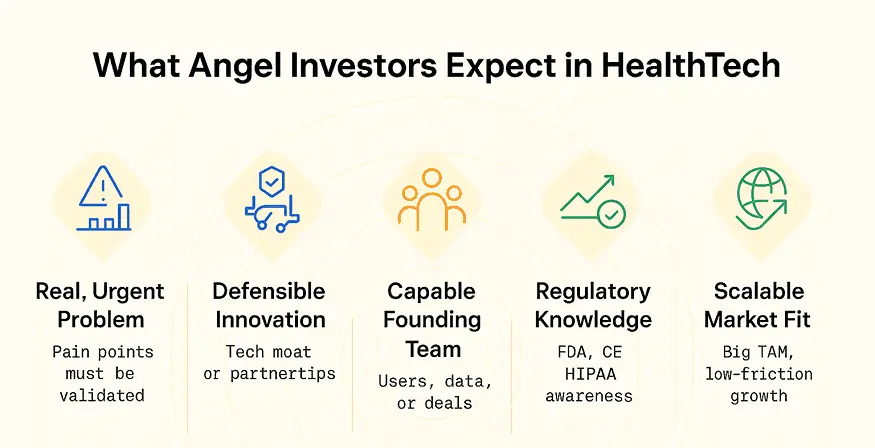Angel investment has long been the lifeblood of early-stage innovation, and HealthTech is now one of the most dynamic sectors for both founders and investors. Digital health startups have collectively raised around $1.5 billion in early-stage funding over the past year, showing that investor confidence remains strong even as broader venture markets cool.
New tax incentives, stronger investor protections, and growing market optimism are encouraging more angels to participate. Around 40% of investors say they plan to increase their HealthTech allocations, signalling deeper capital access for startups in this space.
So what should founders and new angels actually expect from this funding environment?
This article unpacks the key trends, expectations, and on-the-ground realities of angel investing in HealthTech—offering a practical roadmap for anyone ready to dive in.
What Is Angel Investment?
Angel Investment in HealthTech often involves high-net-worth individuals supporting early-stage startups for equity. Angel investors are typically high-net-worth individuals who invest their own capital in early-stage startups in exchange for equity. Unlike venture capitalists, angels often get involved at the riskiest, most formative stages, sometimes before a product even reaches market.
In HealthTech, angels are often doctors, industry veterans, or tech entrepreneurs who bring not just money, but also mentorship, networks, and credibility. Angel rounds in HealthTech typically range from $50,000 to $2 million, with deals often syndicated through angel networks or specialized funds.
Why Angel Investment in HealthTech? Why Now?
The global HealthTech sector is in the midst of a transformation. Rapid advances in AI, telemedicine, remote monitoring, and personalized medicine are reshaping how care is delivered, managed, and financed. The demand for innovative solutions is driven by:
- Aging populations and chronic disease burdens
- A global shift toward value-based care
- Regulatory support for digital health and telemedicine
- Growing consumer expectations for accessible, tech-enabled healthcare
For angel investors, this means unprecedented opportunities to back startups that can deliver both financial returns and meaningful impact.
Key Trends Shaping Angel Investment in HealthTech
1. Specialized Angel Networks Are on the Rise
Gone are the days of generalist angel investing. Today, niche-focused networks, especially in HealthTech, are thriving. These groups pool expertise, share deal flow, and offer targeted mentorship. For founders, joining or pitching to a HealthTech-specific angel group can mean faster funding and more relevant support.
2. AI and Data-Driven Startups Attract the Most Attention
AI-enabled solutions for diagnostics, drug discovery, and personalized care are leading funding rounds. Investors are drawn to startups with strong data science teams, proprietary algorithms, and clear regulatory pathways. In 2025, physician support tools alone represented 26% of all digital health VC rounds in Europe, a share that’s steadily rising.
3. Strategic Partnerships Matter
Startups that secure partnerships with hospitals, payers, or pharma companies are seen as lower-risk bets. Angels increasingly look for evidence of commercial traction or pilot programs, not just promising tech.
4. Tech-Enabled Due Diligence
AI-powered platforms now help angels source deals, evaluate risk, and forecast ROI. Founders should expect deeper, data-driven due diligence and be prepared to back up their claims with real metrics.
What Do Angel Investors Look for in HealthTech Startups?
Angel investors in HealthTech are discerning and often bring deep industry knowledge. Here’s what they typically expect:

1. A Clear, Pressing Problem
HealthTech angels want to see startups addressing real pain points—whether it’s reducing clinician burnout, improving patient outcomes, or streamlining administrative workflows. The problem should be validated by data and market research.
2. Innovative, Defensible Solutions
Is your technology unique? Can it be protected by IP, regulatory barriers, or exclusive partnerships? Angels look for startups with a clear competitive edge, especially in crowded segments like telehealth or digital therapeutics.
3. Strong Founding Teams
Backgrounds in healthcare, technology, and business are a must. Angels want to see founders who can navigate complex regulatory environments, build partnerships, and adapt quickly.
4. Early Traction and Validation
Evidence of pilot programs, paying customers, or strategic partnerships goes a long way. Even in pre-revenue stages, strong user engagement or data from clinical pilots can tip the scales.
5. Regulatory Awareness
HealthTech is highly regulated. Angels expect founders to understand the FDA, CE, HIPAA, and other compliance requirements, and to have a clear roadmap for approvals if needed.
6. Scalability and Market Potential
Is the solution scalable across geographies, health systems, or patient populations? Angels are drawn to startups with large addressable markets and the potential for rapid growth.
The Angel Investment Process: What Founders Should Expect
1. Sourcing and Outreach
The Angel Investment in HealthTech process starts with sourcing deals through networks and referrals. Most HealthTech angels source deals through networks, demo days, or referrals. Founders should research and target angels with relevant backgrounds and interests.
2. Pitching and Initial Screening
Angels expect a concise, data-driven pitch deck. Highlight the problem, solution, market size, traction, team, business model, and funding needs.
3. Due Diligence
Expect questions on clinical validation, regulatory strategy, go-to-market plans, and financial projections. Angels may consult their own networks—doctors, payers, or technologists, for feedback.
4. Negotiation and Terms
Angel rounds are typically less formal than VC deals, but key terms like valuation, equity, board seats, and liquidation preferences are still negotiated. Convertible notes and SAFEs (Simple Agreements for Future Equity) are common.
5. Post-Investment Involvement
Angels often provide hands-on support, introductions, mentorship, and even help with hiring or regulatory strategy. Many expect regular updates and may want advisory roles.
While non-dilutive funding is an excellent way to maintain equity control, some healthcare startups inevitably reach a stage where additional financing becomes essential for rapid growth. To navigate this next phase effectively, you might want to explore our comprehensive guide on Series A & B Funding Strategies for HealthTech, which offers insights into attracting and negotiating investment rounds.
How Much Do Angels Invest in HealthTech?
Across industries, angel investors typically commit $10,000–$250,000 per deal. Outlier deals can exceed these ranges, especially in high-growth sectors like HealthTech. Founders should anticipate flexibility in negotiations.
- Typical check sizes: $50,000–$500,000 per investor, with syndicates sometimes raising $1–2 million per round.
- Valuations: Pre-seed and seed-stage HealthTech startups are typically valued between $2 million and $8 million, though hot AI or biotech companies can command higher numbers.
- Equity stakes: Angels often seek 5–20% equity, depending on round size and risk.
Common Challenges for HealthTech Founders
1. Navigating Regulation
Securing regulatory clearance (FDA, CE) can be time-consuming and expensive. Angels value founders who understand these hurdles and have a clear plan.
2. Clinical Validation
Generating robust clinical data is costly. Angels may help connect startups to trial sites or advisors, but founders should budget for pilot studies and validation.
3. Long Sales Cycles
Selling to hospitals or health systems can take 12–24 months. Angels look for founders who can demonstrate early traction or alternative go-to-market strategies.
4. Competition and IP
HealthTech is crowded. Angels want to see real differentiation, whether through technology, partnerships, or regulatory barriers.
Angel Investment vs. Other HealthTech Funding Sources
Angel Investment in HealthTech offers unique advantages compared to other early-stage funding sources.
For more on alternative funding, see Crowdfunding Options for HealthTech Startups.
Angel Investment in India and Europe: Local Trends
India
As of March 2025, 103 Angel Funds in India have committed Rs. 10,138 crores. This surge builds on liberalized regulations and sustained deal activity. Founders benefit from unprecedented local capital access.
- Angel investment is booming, thanks to government initiatives, liberalized regulations, and a thriving entrepreneurial culture.
- HealthTech angels are increasingly organized, joining networks and funds for better deal flow and support.
- Investment is flowing into AI diagnostics, telemedicine, and digital health platforms, with a focus on scalable, cost-effective solutions.
Europe
- Physician support tools and clinical decision support systems are attracting a growing share of digital health funding, now representing 26% of all rounds.
- Investors are shifting away from remote care and supply chain tools, focusing on technologies that directly impact clinical outcomes.
What Should Angel Investors Expect?
1. High Risk, High Reward
Most HealthTech startups fail, but the winners can deliver outsized returns—especially as acquirers and public markets seek digital health innovation.
2. Longer Timelines
HealthTech exits often take 7–10 years, reflecting regulatory cycles and adoption lags. Angels should be patient and prepared for a long-term commitment.
3. Active Involvement
Angels are often expected to provide more than capital—mentorship, introductions, and even operational support are common.
4. Impact Potential
HealthTech offers a chance to make a difference, improving patient outcomes, reducing costs, or expanding access to care. Many angels are motivated by both financial and social returns.
Navigating Economic Uncertainty in HealthTech Angel Investing
Beyond inherent startup risk, HealthTech angel investors must consider economic uncertainty and market volatility. Fluctuations in funding availability, changing regulatory environments, and shifting exit markets can significantly impact investment outcomes. Proactive risk assessment and flexible investment strategies help angels adapt to unpredictable conditions. Understanding these macro risks is essential for making informed decisions and sustaining long-term portfolio growth.
Portfolio Diversification and Capital Reserves in HealthTech Angel Investing
Building on the need for patience, HealthTech angel investors should diversify their portfolios across 20–30 startups to spread risk. Maintaining disciplined capital reserves, with at least 40% set aside for follow-on rounds, is crucial for supporting portfolio companies through extended development cycles. This approach helps investors withstand longer timelines and increases the likelihood of capturing outsized returns. Thoughtful allocation and diversification distinguish successful HealthTech angels from those in faster-moving tech sectors.
ESG and Impact Investing in HealthTech Angel Decisions
Building on the sector’s impact potential, many HealthTech angels now prioritize ESG and social responsibility when evaluating investments. Environmental sustainability, equitable access, and measurable social outcomes increasingly influence funding decisions. This shift reflects a broader trend where financial returns are balanced with positive societal impact. Founders should highlight ESG initiatives to attract values-driven investors in HealthTech.
if you're committed to maintaining full ownership longer and prefer self-funding your growth journey, our article on Bootstrapping Your HealthTech Venture will guide you through making the most out of limited resources
Real-World Examples
- Orbital Therapeutics (AI-driven RNA medicine) raised $300 million in Series A, highlighting investor appetite for AI-powered biotech.
- HealthTech 250 startups collectively raised $1.5 billion in early-stage funding in 2025, with a focus on data-driven, scalable solutions.
- Behavioral health apps are dominating reimbursement pipelines, with some startups doubling valuations after securing Medicare coverage.
Tips for Founders: Making the Most of Angel Investment
- Build relationships: Regular updates and open communication foster trust and long-term support.
- Target the right angels: Look for investors with healthcare expertise and relevant networks.
- Be transparent: Share challenges as well as wins—angels appreciate honesty.
- Leverage mentorship: Tap into your angels’ experience for regulatory, clinical, and go-to-market guidance.
Conclusion
Angel investment in HealthTech shows no sign of slowing. As AI, digital health, and personalized medicine continue to disrupt care, angels will remain essential for fueling the next wave of innovation. Founders should expect a more specialized, data-driven, and inclusive investment environment, one where strategic support matters as much as capital.
If you’re looking to turn angel interest into actionable momentum, at Qubit we understand early proof, signal-driven outreach, and round choreography. Move faster with our healthtech fundraising assistance and book a quick strategy call.
Key Takeaways
- Specialized angel networks, AI-driven due diligence, and a focus on diversity are shaping the new investment landscape.
- Angels seek strong teams, validated solutions, regulatory awareness, and early traction.
- Expect deep due diligence, active involvement, and a long-term outlook from HealthTech angels.
- For founders, targeting the right investors and leveraging their expertise can be as valuable as the funding itself.
Frequently asked Questions
What are the latest HealthTech angel investment trends?
In 2025, HealthTech angels focus on AI, digital health, and specialized networks. Strategic partnerships and data-driven due diligence are driving investment decisions.






